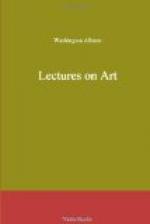We add but one remark. Supposing the artist to be wholly freed from all modifying biases, such is seldom the case with those who criticize his work,—especially those who would show their superiority by detecting faults, and who frequently condemn the painter simply for not expressing what he never aimed at. As to some, they are never content if they do not find beauty, whatever the subject, though it may neutralize the character, if not render it ridiculous. Were Raffaelle, who seldom sought the purely beautiful, to be judged by the want of it, he would fall below Guido. But his object was much higher,—in the intellect and the affections; it was the human being in his endless inflections of thought and passion, in which there is little probability he will ever be approached. Yet false criticism has been as prodigal to him in the ascription of beauty, as parsimonious and unjust to many others.
In conclusion, may there not be, in the difficulty we have thus endeavoured to solve, a probable significance of the responsible, as well as distinct, position which the Human being holds in the world of life? Are there no shadowings, in that reciprocal influence between soul and soul, of some mysterious chain which links together the human family in its two extremes, giving to the very lowest an indefeasible claim on the highest, so that we cannot be independent if we would, or indifferent even to the very meanest, without violation of an imperative law of our nature? And does it not at least hint of duties and affections towards the most deformed in body, the most depraved in mind,—of interminable consequences? If man were a mere animal, though the highest animal, could these inscrutable influences affect us as they do? Would not the animal appetites be our true and sole end? What even would Beauty be to the sated appetite? If it did not, as in the last instance, of the brutal husband, become an object of scorn,—which it could not be, from the necessary absence of moral obliquity,—would it be better than a picked bone to a gorged dog? Least of all could it resemble the visible sign of that pure idea, in which so many lofty minds have recognized the type of a far higher love than that of earth, which the soul shall know, when, in a better world, she shall realize the ultimate reunion of Beauty with the coeternal forms of Truth and Holiness.
We will now apply the characteristic assumed to the second leading Idea, namely, to Truth. In the first place, we take it for granted, that no one will deny to the perception of truth some positive pleasure; no one, at least, who is not at the same time prepared to contradict the general sense of mankind, nay, we will add, their universal experience. The moment we begin to think, we begin to acquire, whether it be in trifles or otherwise, some kind of knowledge; and of two things presented to our notice, supposing one to be true and the other false, no one ever knowingly,




